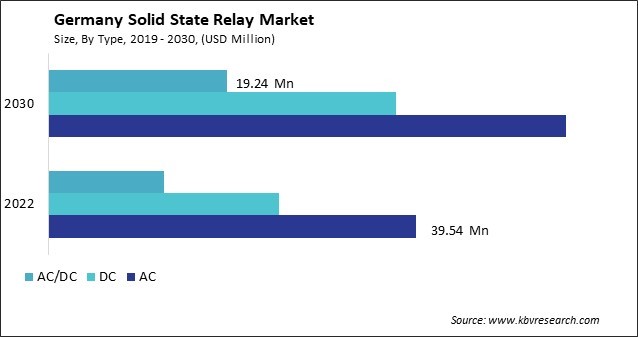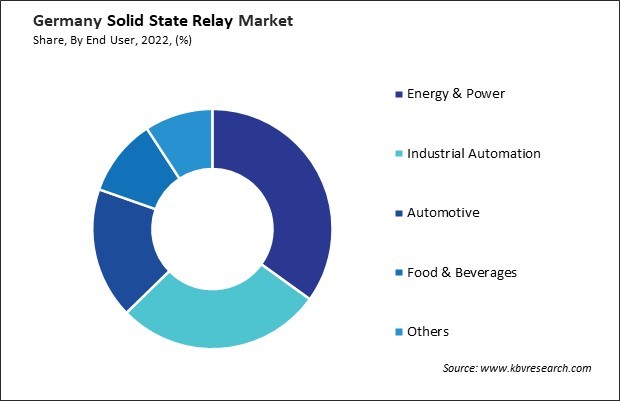Int'l : +1(646) 600-5072 | query@kbvresearch.com
Int'l : +1(646) 600-5072 | query@kbvresearch.com
Published Date : 29-Oct-2024 |
Pages: 99 |
Formats: PDF |
The Germany Solid State Relay Market size is expected to reach $112.33 Million by 2030, rising at a market growth of 5.0% CAGR during the forecast period. In the year 2022, the market attained a volume of 1,714.11 Thousand Units, experiencing a growth of 5.4% (2019-2022).
The solid state relay market in Germany has been experiencing steady growth over the past few years. One of the key drivers of the solid state relay market in Germany is the rapid adoption of automation technologies across industries such as manufacturing, automotive, aerospace, and healthcare. Solid state relays (SSRs) play a crucial role in these sectors by providing precise and reliable control over electrical loads, thereby improving overall operational efficiency and productivity. Moreover, the growing emphasis on energy conservation and sustainability has led to the increased deployment of SSRs in renewable energy systems, electric vehicles, and smart grid infrastructure.

Furthermore, the ongoing digitization and Industry 4.0 initiatives in Germany are driving the adoption of SSRs embedded with IoT (Internet of Things) capabilities for remote monitoring, predictive maintenance, and real-time analytics. This trend is expected to accelerate the growth of the solid state relay market as industries strive to optimize their operations and minimize downtime.
According to Germany Trade & Invest, with the IoT expenditure in Germany exceeding EUR 35 billion and IoT-generated revenue doubled from EUR 22.5 billion in 2018 to EUR 45 billion in 2023, the technological landscape is undergoing significant transformation. Amidst this technological surge, the solid state relay market in Germany is poised for significant expansion, fueled by the increasing integration of IoT systems across various industries.
Additionally, the growing trend towards smart grid infrastructure and renewable energy integration is expected to fuel the demand for SSRs in Germany's energy sector. SSRs play a vital role in grid stabilization, load balancing, and power quality improvement, enabling seamless integration of renewable energy sources such as solar and wind power.
According to the Umwelt Bundesamt, Germany has witnessed continuous growth in renewable energies, with their contribution to gross final energy consumption reaching 20.8% in 2022. The primary catalyst for this surge has been the electricity sector, where renewables have already accounted for an impressive 46.0% of total electricity consumption in the same year. With the increasing integration of renewable energy sources into the grid, the solid state relay market in Germany is poised for further expansion to support the country's transition towards a greener and more resilient energy landscape.
Moreover, COVID-19 has significantly impacted the solid state relay market in Germany, causing disruptions in the supply chain, production delays, and project cancellations across various industries. The pandemic-induced lockdowns and restrictions have led to a temporary slowdown in industrial activities, resulting in reduced demand for SSRs in the short term. However, as the economy gradually recovers and industries resume operations, the demand for SSRs is expected to rebound in Germany, driven by the need to enhance automation, improve manufacturing efficiency, and ensure business continuity in a post-pandemic scenario.
In Germany, the solid state relay market is experiencing a notable shift towards the adoption of PCB mount configurations. One key driver behind this surge in PCB mount solid state relay (SSR) adoption is the relentless pursuit of miniaturization and space optimization. As technology advances, manufacturers are under increasing pressure in Germany to develop products that occupy less physical space while delivering optimal performance. PCB mount SSRs offer a streamlined solution by integrating directly onto the circuit board, eliminating the need for additional mounting hardware and reducing overall footprint.
Furthermore, the inherent electrical characteristics of PCB mount SSRs make them well-suited for high-frequency switching applications. Their proximity to other components on the circuit board minimizes stray inductance and capacitance, resulting in faster response times and improved electromagnetic compatibility (EMC) performance.
Additionally, the growing emphasis on energy efficiency and sustainability is driving the adoption of PCB mount SSRs in Germany. These relays offer improved thermal management capabilities compared to traditional through-hole mount counterparts, leading to lower power losses and reduced energy consumption. Hence, the increasing demand for miniaturization, enhanced performance, and energy efficiency is propelling the shift towards PCB mount solid state relays in Germany.
The solid state relay market in Germany is experiencing a significant shift towards energy efficiency and sustainability. One key driver of this trend is the increasing focus on reducing energy consumption and greenhouse gas emissions to mitigate climate change. Germany, known for its stringent environmental regulations and ambitious sustainability goals, has been at the forefront of promoting energy-efficient technologies across various industries. Solid state relays (SSRs) play a crucial role in improving energy efficiency by minimizing power losses and optimizing energy usage in electrical systems.
Moreover, the rising awareness among consumers and businesses in Germany about the environmental impact of their operations has led to a growing demand for eco-friendly products. SSR manufacturers are responding to this demand by integrating sustainable practices into their production processes, such as using recyclable materials, reducing waste generation, and implementing energy-efficient manufacturing techniques.
Furthermore, government initiatives and incentives aimed at promoting energy efficiency are driving the adoption of SSRs in various applications, including industrial automation, automotive, renewable energy systems, and building automation. For instance, subsidies for energy-efficient equipment and tax incentives for companies investing in sustainable technologies are encouraging businesses to upgrade their electrical systems with SSRs. Therefore, the solid state relay market in Germany is witnessing a significant shift towards energy efficiency and sustainability, driven by environmental awareness, stringent regulations, and government incentives.

Germany, renowned for its engineering prowess, is home to several prominent players in the solid state relay market. One of the leading players in the German solid state relay market is Siemens AG. Established in 1847, Siemens has evolved into a global powerhouse in electrification, automation, and digitalization. The company's the solid state relay (SSR) offerings encompass a comprehensive range of products designed for industrial automation, power distribution, and energy management. Siemens' SSRs are known for their reliability, efficiency, and advanced features, making them indispensable components in modern control systems and machinery.
Phoenix Contact GmbH & Co. KG is also a significant contender in the German solid state relay market. Founded in 1923, Phoenix Contact specializes in electrical connectivity, industrial automation, and electronic interface systems. The company's SSR offerings encompass a wide range of products tailored to meet the needs of industrial control, machinery, and renewable energy applications. Phoenix Contact's SSRs are characterized by their compact design, high reliability, and compatibility with standard DIN rail mounting, providing customers with easy installation and integration.
Another key player in the German solid state relay market is ABB Group. With a history dating back to the late 19th century, ABB has established itself as a leader in power and automation technologies. The company's SSR product portfolio includes a diverse array of solutions optimized for applications such as motor control, heating control, and building automation. ABB's SSRs are renowned for their robust construction, high switching capability, and compatibility with various control systems, offering customers enhanced flexibility and performance.
Weidmüller Interface GmbH & Co. KG is another notable player in the German solid state relay market. Established in 1850, Weidmüller has a long history of providing innovative solutions for industrial connectivity and automation. The company's SSR product portfolio includes a variety of options designed for motor control, process automation, and power distribution applications. With a focus on meeting the evolving needs of industrial automation and control systems, companies in this sector continue to drive advancements in SSR technology, reinforcing Germany's position as a global leader in engineering excellence.
By Type
By End User
By Mounting Type